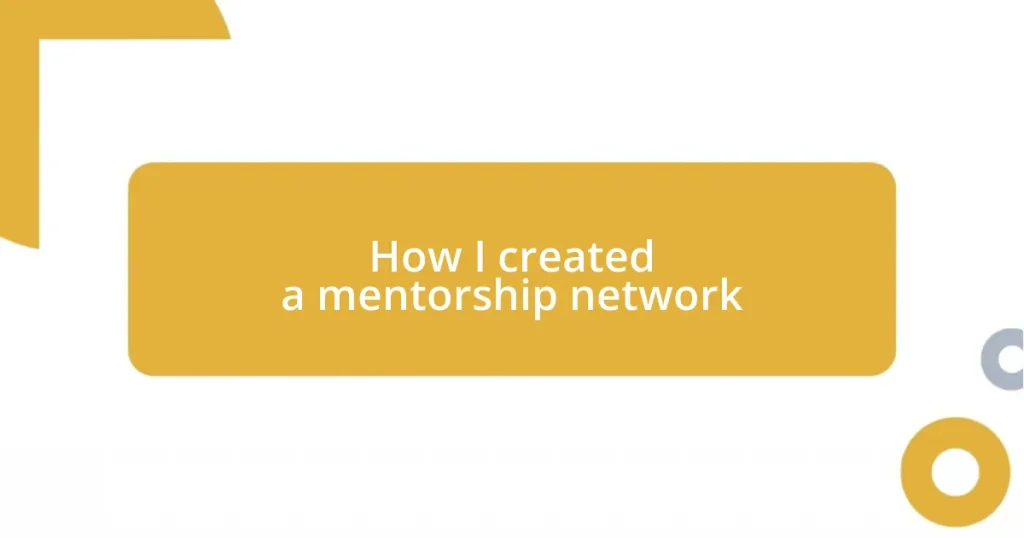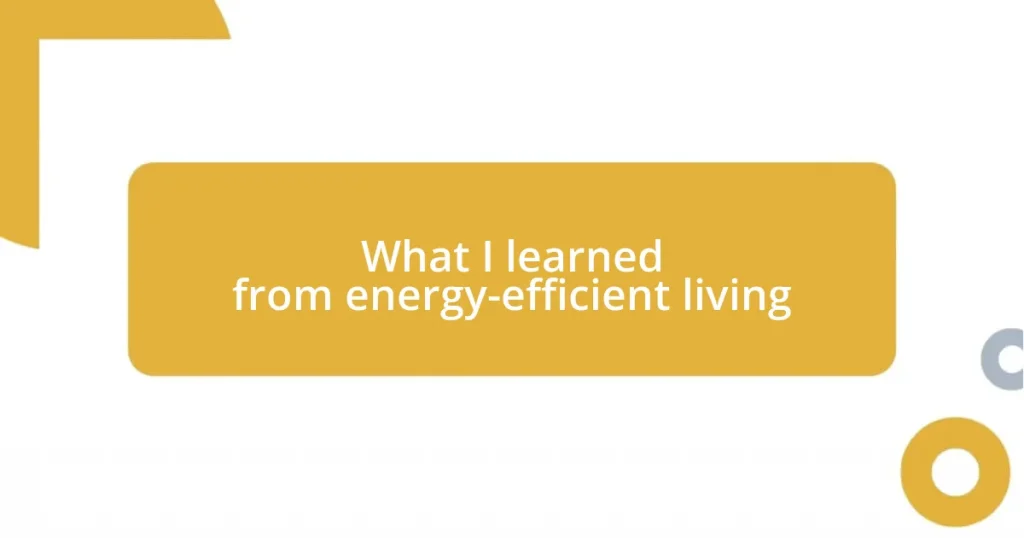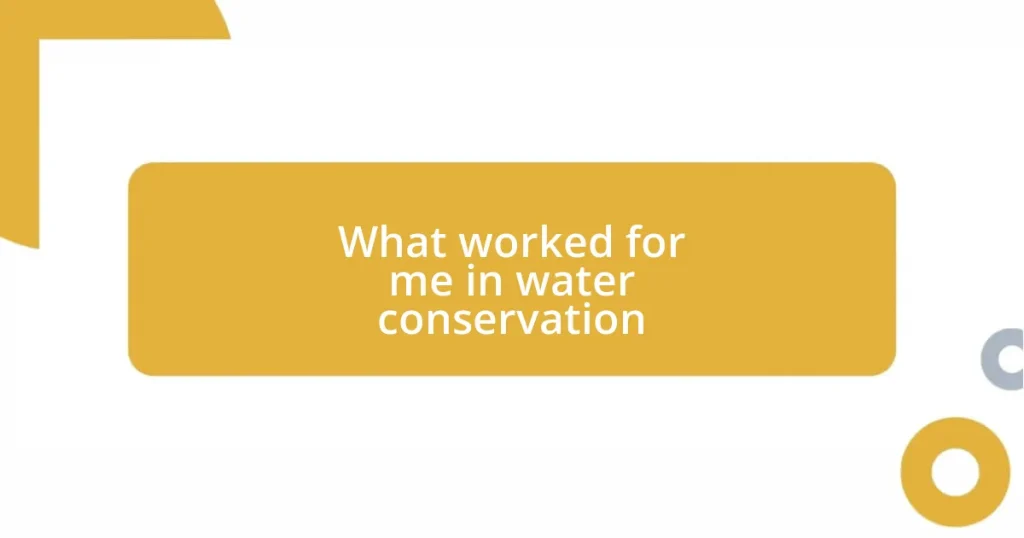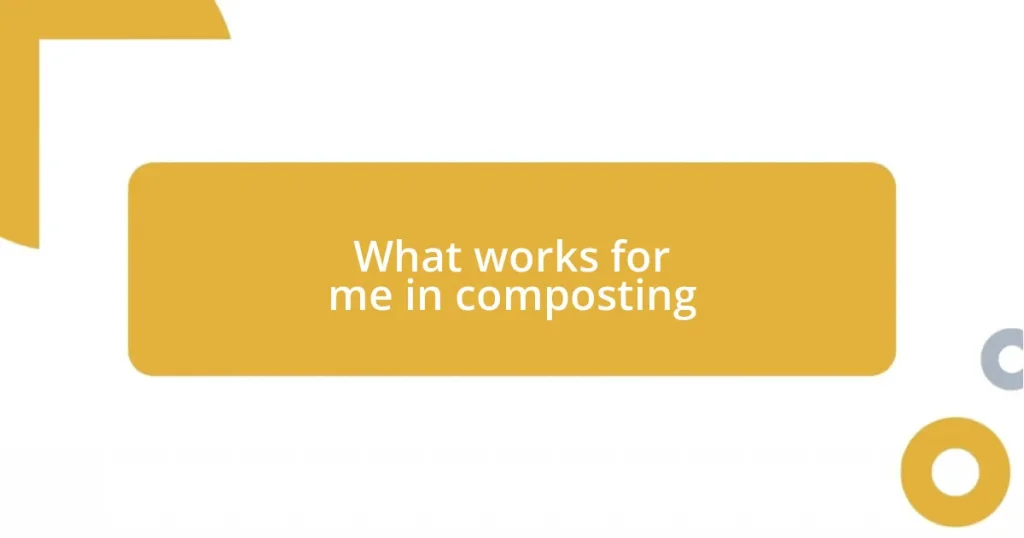Key takeaways:
- Mentorship networks provide support, accountability, and opportunities for personal and professional growth through diverse relationships.
- Identifying potential mentors involves self-reflection on goals, evaluating attributes like expertise and approachability, and staying open-minded.
- Building genuine relationships with mentors requires consistent communication, mutual respect, and a focus on shared interests.
- Organizing engaging mentorship activities and leveraging technology can enhance community bonding and accessibility within the network.

Understanding mentorship networks
Mentorship networks are pivotal bridges that connect individuals seeking growth with seasoned professionals willing to share their wisdom. In my own journey, I found that every mentor not only guided me but also introduced me to new connections, creating a ripple effect. Have you ever thought about how a single conversation can open doors to opportunities you never imagined?
What I’ve come to appreciate is the diversity within mentorship networks. They aren’t just about finding a mentor; they’re about surrounding yourself with a community that shares knowledge and support. I remember my first experience joining a network – the excitement was palpable, yet I was also a bit overwhelmed. But leaning into that vulnerability ultimately led me to invaluable relationships.
Understanding mentorship networks means recognizing that they can be a source of inspiration and accountability. When I was navigating career transitions, having a group of mentors not only provided guidance but also reassurance that I wasn’t alone in my struggles. Isn’t it comforting to know that others have walked the same path and are willing to lend a hand?

Identifying potential mentors
When I set out to identify potential mentors, I realized it was essential to reflect on my goals and the specific areas where I sought guidance. This self-awareness helped me pinpoint individuals who aligned with my aspirations, making it easier to connect. Along the way, I discovered that potential mentors can come from unexpected places.
Here are some key attributes I looked for in my search:
- Expertise: They should have experience in the field that interests you.
- Approachability: A potential mentor should be someone you feel comfortable reaching out to.
- Shared Values: It’s important that their values and work ethic resonate with your own.
- Diversity of Experience: Those with varied backgrounds can provide different perspectives and insights.
- Willingness to Share: Look for individuals who have a history of mentoring others or are open to future commitments.
By leveraging these criteria, I was able to form a clearer picture of who could effectively guide me on my journey. I remember feeling an overwhelming sense of enthusiasm when I spotted a leader in my field at a conference—someone whose career trajectory mirrored the path I aspired to follow. Seeing them in action not only inspired me but also sparked a desire to reach out and learn from their experiences. The key, I learned, is to stay open-minded and proactive; the right mentors often emerge when you least expect them.

Building relationships with mentors
Building relationships with mentors can feel intimidating at first, but I’ve found that a genuine approach goes a long way. When I reached out to my mentors, I focused on shared interests and goals, which helped to establish a sense of camaraderie. During my first conversation with a mentor, I remember how relaxed I felt once I shared my aspirations; it was as if I had finally found a safe space to express my dreams and vulnerabilities.
As I nurtured these connections, I noticed the importance of consistency in communication. I made it a point to check in regularly, whether through emails or casual coffee catch-ups. I vividly recall one instance where I simply asked for feedback on a project. That moment led to a deeper discussion about personal challenges and more tailored guidance, illustrating how open communication can evolve relationships into empowering partnerships.
Additionally, mutual respect significantly contributes to the strength of these mentorship bonds. I learned that valuing my mentor’s time and insights creates a reciprocal environment. For example, after one mentor shared their journey through challenges, I offered to assist them with a project they were passionate about. That gesture not only solidified our connection but also enriched my understanding of their work. Thus, building genuine relationships with mentors is both an art and a practice that deepens over time.
| Aspect | My Experience |
|---|---|
| Initial Reach Out | Focused on shared interests to foster connection. |
| Communication | Regular check-ins led to deeper discussions and tailored guidance. |
| Mutual Respect | Offering assistance created reciprocal and enriching relationships. |

Creating value for your network
Creating value within your mentorship network is crucial for maintaining strong, reciprocal relationships. From my experience, I realized that offering something of value—whether it’s sharing resources, providing insights, or simply lending an ear—can truly enhance these connections. I once took the time to curate articles that aligned with a mentor’s interests, which not only sparked an engaging discussion but also made it clear that I genuinely valued their expertise.
I’ve found that vulnerability can be a powerful tool for creating value. By openly sharing my own challenges, I invite my mentors to do the same. This openness fosters a deeper bond. I remember a time when I shared my struggles with navigating my career path; the mentor responded with her own stories of uncertainty. That exchange was transformative, leading to profound discussions and invaluable lessons, illuminating the fact that mentorship thrives in an atmosphere of mutual honesty.
Furthermore, proactively seeking feedback can also enrich your network. For instance, I once asked one of my mentors for candid insight on a presentation I was preparing. Her critiques not only refined my work but also opened the door for more discussions about her own past presentations. This dynamic helped reinforce the relationship while underscoring the value of continuous learning. Have you considered how your interactions can be more than just transactional? Each thoughtful engagement can strengthen the fabric of your mentorship network, creating a vibrant community of shared growth and insight.

Organizing mentorship activities
Organizing mentorship activities can often feel like a daunting task, yet I’ve discovered that a simple approach can lead to meaningful experiences for everyone involved. When I first started organizing events, I focused on the interests of both mentors and mentees, ensuring that everyone felt excited about participating. For example, I remember planning a networking lunch where we discussed real-life challenges—nothing like the traditional stiff environment. The laughter and shared experiences created an intimate atmosphere that encouraged open dialogue.
Additionally, setting a clear agenda can help maintain structure while allowing room for flexibility. I once facilitated a workshop around skill-sharing, where both mentors and mentees could take turns presenting their expertise. I was amazed by the level of engagement; it sparked not only learning but also fostered relationships that extended beyond that single event. Are you open to incorporating diverse formats in your mentorship activities to keep things fresh and inviting?
Moreover, leveraging technology can enhance accessibility and convenience. I’ve found that scheduling virtual meet-ups can particularly benefit those with tight schedules. During one of my online sessions, we used breakout rooms to allow for smaller group discussions. It felt like stepping into a cozy coffee shop, where rich conversations flowed, despite being miles apart. These organized activities not only bridge gaps but also contribute to a sense of community. How often do you consider using innovative methods to strengthen connections within your mentorship network?

Scaling your mentorship network
Scaling a mentorship network often feels like a balancing act. In my journey, I learned that consistent communication is key to growth. I recall when I decided to create a monthly newsletter that not only shared insights from our discussions but also highlighted achievements within the network. This small effort drew everyone closer and encouraged members to engage more actively, transforming our network into a dynamic environment where everyone felt celebrated.
When expanding your network, consider the strength of collaborations. I remember the time I partnered with another group to host a panel discussion featuring diverse voices from various fields. The energy was electric, and it opened doors for new connections that I couldn’t have achieved on my own. Could you imagine the possibilities if you tapped into other networks? This approach not only enriches your existing community but also invites fresh perspectives and ideas.
Lastly, be open to the idea of mentorship pairs evolving over time. I’ve seen relationships flourish when previous mentees return as mentors themselves, creating a beautiful cycle of knowledge-sharing. It can be inspiring to witness this evolution. Have you thought about how you can nurture these transformations within your network? Embracing such changes can unveil new layers of value that elevate your mentorship ecosystem to new heights.















